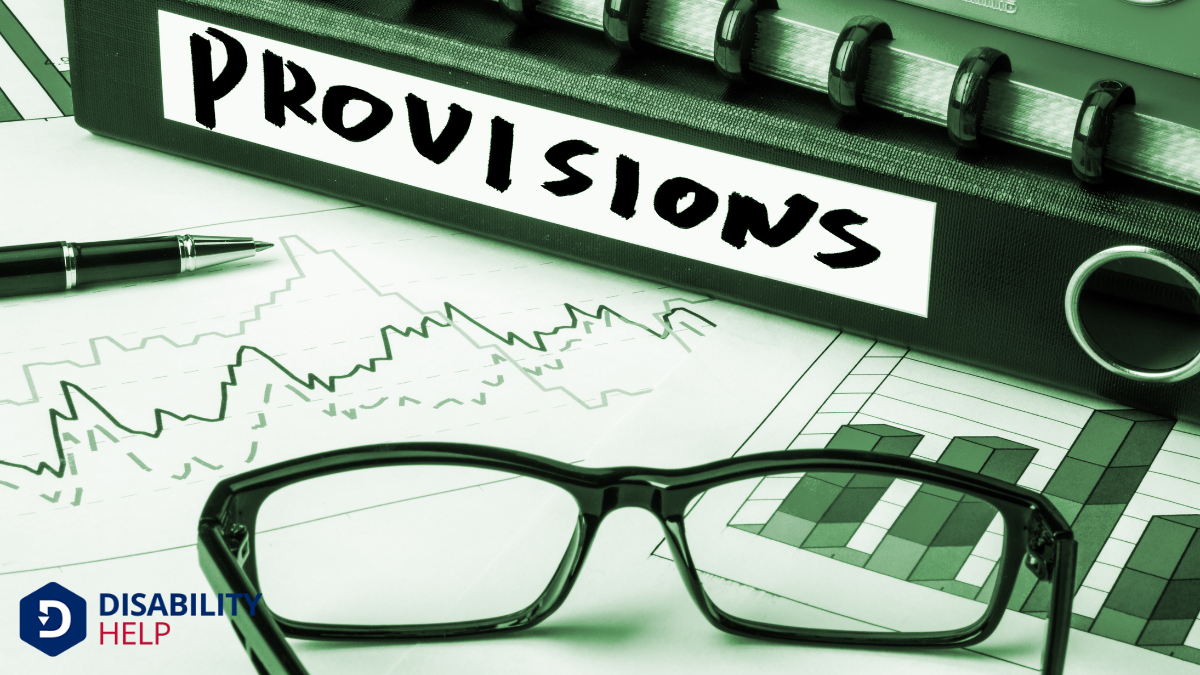When we look at workplace promotion decisions, disability law, especially the Americans With Disabilities Act (ADA)A U.S. law that prohibits discrimination against individuals with disabilities in all areas of publi..., plays an essential role. It guarantees that employees are judged on their abilities and contributions, not their disabilities. Employers must provide reasonable accommodationsModifications or adjustments in healthcare settings to support patients with disabilities. and design fair processes to eliminate bias. But how do these laws actually reshape the way promotions are handled? Let's explore the impact and uncover strategies for fostering an inclusive workplace.
Key Takeaways
- Disability law mandates objective, bias-free promotion criteria to ensure fair assessment of employees with disabilities.
- Employers must provide reasonable accommodations, like modified schedules, to support equal promotion opportunities for disabled employees.
- The ADA prohibits discrimination, ensuring promotions are based on qualifications, not disabilities.
- Regular bias training and diverse promotion panels help eliminate discrimination in promotion decisions.
- Transparent promotion policies and feedback mechanisms enhance inclusivity and fairness in workplaces.
Understanding the Americans With Disabilities Act (ADA)
Although many of us have heard about the Americans With Disabilities Act (ADA), it's crucial to understand its impact on workplace dynamics. The ADA, enacted in 1990, prohibits discrimination against individuals with disabilities in various areas, including employment. By promoting inclusivity, it guarantees equal opportunities for everyone, regardless of physical or mental challenges.
We must remember that the ADA requires employers to provide reasonable accommodations, which can be adjustments or modifications that enable individuals to perform their job effectively. This not only enhances accessibilityThe design of products, devices, services, or environments to be usable by people with disabilities.... but also fosters a diverse and productive work environment.
Our understanding of ADA helps us support colleagues, creating a workplace culture where everyone thrives. By embracing these principles, we contribute to a fairer, more equitable professional landscape.
Key Provisions of Disability Law in Promotions

Let's explore the key provisions of disability law that impact promotion decisions in the workplace.
We need to take into account how equal opportunity mandates guarantee that employees with disabilities have the same chances for advancement as their peers.
Additionally, understanding the reasonable accommodations requirement helps us see how employers can support qualified individuals in achieving their career goals.
Equal Opportunity Mandates
When it comes to workplace promotions, equal opportunity mandates within disability law play an essential role in ensuring fairness and inclusivity.
These mandates require us to evaluate employees based on their qualifications and performance, not their disabilities. This means:
- Objective Criteria: Decisions should rely on measurable achievements and skills rather than assumptions about a person’s capabilities.
- Bias-Free Processes: We must remove any discriminatory practices that might hinder fair assessment, ensuring all candidates have an equal footing.
- Transparent Communication: Clearly outlining promotion criteria helps individuals understand expectations and fosters a culture of transparency.
- Training and Awareness: Educating managers and staff about these mandates promotes understanding and reduces unconscious bias.
Reasonable Accommodations Requirement
To guarantee fair promotion decisions, we must prioritize the reasonable accommodations requirement, a key provision within disability law. This requirement guarantees that qualified employees with disabilities receive necessary adjustments to perform essential job functions effectively.
When considering promotions, we should evaluate how accommodations can enable candidates to succeed in new roles.
We’re responsible for fostering an inclusive workplace by anticipating potential needs and discussing them openly with employees. It’s not just about compliance; it’s about valuing diverse talents and perspectives.
By understanding and implementing accommodations, we can remove barriers to advancement and demonstrate our commitment to equality.
Promotions shouldn’t be hindered by a lack of support. Let’s work together to create opportunities where everyone can thrive, regardless of ability.
Common Misconceptions About Employees With Disabilities
Many of us harbor misconceptions about employees with disabilities, often stemming from a lack of awareness or outdated stereotypes.
Let's address some of these myths and foster a more inclusive mindset.
1. Productivity Myth: We might mistakenly believe employees with disabilities can’t be as productive.
In reality, they often develop creative ways to excel in their roles.
2. Cost Assumption: There's a perception that accommodating these employees is costly.
However, many accommodations are low-cost or even free.
3. Limited Roles: Some assume they can only perform certain jobs.
Yet, people with disabilities contribute across all sectors and roles.
4. Reliability Concerns: It's a myth that they’re less reliable.
Attendance and retention rates are often comparable or better than those of non-disabled employees.
Understanding these misconceptions helps us create a fairer workplace.
Assessing Merit: Balancing Skills and Accommodations
While evaluating merit for workplace promotions, it’s crucial to balance an employee's skills with any necessary accommodations. We must consider how well an individual performs core job tasks and how accommodations enhance their ability to succeed.
When determining merit, let's focus on both the employee's achievements and their potential for growth, recognizing that accommodations aren't advantages but vital tools for leveling the playing field.
Understanding this balance helps us create an inclusive promotion process. We should look at how employees utilize their strengths and how accommodations support their performance.
Legal Requirements for Reasonable Accommodations

When we consider the legal requirements for reasonable accommodations, it's vital to understand what qualifies as "reasonable" and how these accommodations can affect promotion decisions.
As employers, we must guarantee that our policies don't unintentionally hinder the advancement of employees with disabilities.
Defining Reasonable Accommodations
Reasonable accommodations are vital in guaranteeing that individuals with disabilities have equal opportunities in the workplace.
As we explore what constitutes reasonable accommodations, it's important to understand that these adjustments must be both effective and practical.
Here are some examples:
- Modified Work Schedules: Allowing flexible hours or part-time shifts can help employees manage their health needs or appointments.
- Accessible Workspaces: Providing ramps, adjustable desks, or special seating guarantees physical accessibility for all employees.
- Assistive Technology: Supplying screen readers or voice recognition software can support employees with visual or auditory impairments.
- Job Restructuring: Reallocating non-essential tasks allows employees to focus on their strengths without compromising their roles.
These accommodations not only comply with legal standards but also foster an inclusive and supportive work environment.
Impact on Promotion Decisions
Understanding reasonable accommodations sets the stage for examining their role in promotion decisions. When we consider promoting employees with disabilities, legal requirements guide us to guarantee fairness.
These accommodations can range from modifying work duties to providing specialized equipment. It's essential for us to remember that these adjustments aren't just about compliance—they're about fostering an inclusive environment where everyone can thrive.
Incorporating reasonable accommodations into our promotion processes means evaluating each candidate based on their skills and potential, not their limitations. This approach helps us to reveal a diverse range of talents within our teams.
Identifying and Eliminating Bias in Promotion Processes
Although promotion decisions should be based on merit and performance, biases can subtly influence these processes, often disadvantaging employees with disabilities.
To create a fairer workplace, we must actively identify and eliminate these biases. Here are the steps we can take:
- Review Criteria: Regularly audit promotion criteria to guarantee they’re inclusive and don’t inadvertently favor able-bodied employees.
- Bias Training: Conduct mandatory bias training for all decision-makers to raise awareness and reduce unconscious bias.
- Diverse Panels: Assemble diverse promotion panels to provide varied perspectives and minimize individual biases.
- Feedback Mechanisms: Implement anonymous feedback systems allowing employees to report bias without fear of retaliation.
Case Studies: Successful Promotion Practices for Inclusivity
When we examine successful promotion practices that foster inclusivity, real-world examples provide valuable insights.
Consider a company where managers actively seek input from employees with disabilities during policy development. This practice guarantees that those directly affected contribute to creating a more inclusive environment.
Another effective approach is implementing mentorship programsPrograms that pair individuals with disabilities with experienced professionals to provide guidance ... connecting disabled employees with experienced colleagues who guide and advocate for their career advancement.
We’ve also seen success in companies using transparent criteria for promotions. By clearly outlining expectations and qualifications, everyone understands what’s needed to advance, reducing bias and fostering fair opportunities.
Regular feedback sessions with HR guarantee that any potential barriers for employees with disabilities are addressed promptly.
The Role of Training and Awareness in Compliance

Training and awareness play an essential role in guaranteeing compliance with disability laws in the workplace. When we invest in educating our teams, we're not just adhering to legal standards; we're fostering an environment where everyone feels valued.
Consider the following steps to enhance our compliance efforts:
- Regular Workshops: We can host sessions that focus on the nuances of disability laws and how they relate to promotion decisions.
- Inclusive Training Materials: Providing resources that highlight real-life scenarios aids in understanding complex regulations.
- Role-Playing Exercises: These help employees practice respectful interactions and decision-making processes.
- Feedback Mechanisms: Encouraging open dialogue guarantees that we continuously improve our practices and address any concerns.
Strategies for Building an Inclusive Promotion Policy
As we enhance our compliance efforts through training and awareness, it's equally important to focus on crafting an inclusive promotion policy.
Together, we can create a workplace that values diverse abilities and perspectives. First, let's guarantee our promotion criteria are transparent, fair, and free from bias.
We should regularly review these criteria with input from diverse team members to identify and eliminate any barriers. In addition, providing opportunities for mentorship and career developmentThe process of managing life, learning, and work over the lifespan, including for individuals with d... tailored to individual needs can empower all employees to excel.
Finally, let's commit to continuous dialogue, welcoming feedback that can guide improvements. By prioritizing an inclusive promotion policy, we foster a culture of equityFairness and justice in the way people are treated, especially in the allocation of resources and op..., where everyone has a fair chance to advance based on their skills and contributions.
Frequently Asked Questions
How Can Employers Measure Potential in Employees With Disabilities?
We can measure potential by focusing on skills, performance, and goals rather than limitations. Let’s guarantee our assessments are fair and inclusive, considering accommodations that enable employees with disabilities to showcase their full capabilities.
What Role Do Disability Advocacy Groups Play in Workplace Promotions?
We rely on disability advocacyEfforts and services aimed at protecting and promoting the rights and interests of individuals with ... groups to guarantee fair promotion processes. They advise on inclusive practices, provide resources, and promote awareness. Let's work together with them to create equitable opportunities for everyone in our workplace.
How Does Disability Law Intersect With Other Employment Laws During Promotions?
We should consider how disability law intersects with employment laws like anti-discrimination and equal opportunity. This guarantees fair promotion processes. By understanding these connections, we can advocate for inclusive environments and uphold employees' rights during promotions.
Are There Specific Industries More Affected by Disability Promotion Regulations?
Let's explore how certain industries might feel disability promotion regulations more keenly. Industries with high physical demands or strict safety standards often face unique challenges, but all sectors must guarantee equal opportunities for employees with disabilities.
How Can Technology Aid in Fair Promotion Decisions for Employees With Disabilities?
We can use technology to guarantee fair promotion decisions by implementing accessible communication tools and performance evaluation software. These tools level the playing field, allowing us to focus on skills and contributions, not disabilities.
Conclusion
In summary, we must recognize the essential role disability law plays in shaping fair promotion decisions. By adhering to the ADA's guidelines, we're not just complying with legal requirements but actively fostering a more inclusive workplace. Dispelling misconceptions, offering reasonable accommodations, and conducting unbiased assessments are significant steps. Let’s commit to continuous training and policy improvement so that every employee, regardless of ability, has an equal opportunity to advance based on their skills and contributions.






